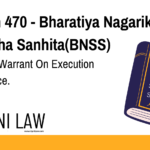Code
The powers conferred by Sections 473 and 474 upon the State Government may, in the case of sentences of death, also be exercised by the Central Government.
Explanation of Section 476 BNSS
Key Provisions:
- Concurrent Power: This section grants the Central Government the same power as the State Government in cases involving the death penalty.
- Reference to Sections 473 & 474:
- Section 473 BNSS gives the power to suspend or remit sentences.
- Section 474 BNSS allows the commutation of sentences (e.g., death penalty to life imprisonment).
- Application: In death penalty cases, the Central Government can override, modify, or approve decisions made by the State Government regarding remission or commutation.
Illustration: Example of Application
✅ Example 1: Central Government Overruling a State Decision
A prisoner in State A has been sentenced to death for a heinous crime. The State Government decides to commute the death sentence to life imprisonment under Section 474 BNSS. However, the Central Government may review the decision and choose to uphold, reject, or modify it, as it has concurrent power under Section 476 BNSS.
✅ Example 2: Central Government Commuting a Death Sentence
A convict sentenced to death applies for remission under Section 473 BNSS. The State Government does not act on the request, but the Central Government may still decide to commute or remit the sentence using its powers under Section 476 BNSS.
Common Questions and Answers
✅ Q1: Does Section 476 BNSS mean only the Central Government can decide on death sentences?
No, the State Government also has powers under Sections 473 and 474 BNSS. However, in cases involving the death penalty, the Central Government has concurrent power, meaning it can review and override State decisions.
✅ Q2: Can a convict directly appeal to the Central Government for sentence commutation?
Yes, if a death sentence is involved, the convict or their family can appeal to the Central Government, even if the State Government has already made a decision.
✅ Q3: What happens if the State Government and Central Government have different opinions?
In case of a conflict, the Central Government’s decision will prevail in matters concerning the death penalty.
✅ Q4: Does Section 476 BNSS apply to life imprisonment or other sentences?
No, it only applies to cases where the sentence is death. For life imprisonment or other sentences, only the State Government has the power under Sections 473 and 474 BNSS.
Conclusion
Section 476 BNSS provides concurrent powers to the Central Government in cases involving the death penalty, allowing it to review, modify, or override decisions made by State Governments under Sections 473 and 474 BNSS. This ensures a higher level of scrutiny in capital punishment cases, reinforcing justice, fairness, and consistency in the application of the law.








